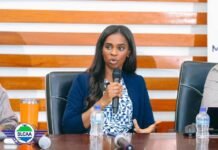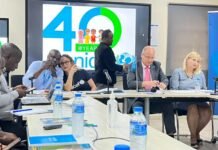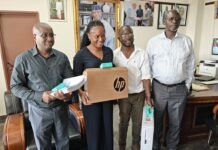By Foday Moriba Conteh
The National Commission for Democracy (NCD), with support from International IDEA and funding from the European Union, concluded the Inaugural Meeting of the Steering Committee on the State of Sierra Leone’s Democracy Survey on Thursday, July 4, 2024. The Survey aims to assess Sierra Leone’s state of democracy, identify democratic challenges and provide actionable recommendations to address these issues. The event took place at the Commission’s Resource Center, 9th Floor, West Wing of Youyi Building in Freetown.
In her address, Marian Samu, Executive Chairman of the NCD, emphasized that part of the statutory mandate of the National Commission for Democracy is to conduct research to “assess for the information of Government the limitations to the achievement of true democracy arising from existing inequalities between different strata of the population and make recommendations for redressing those inequalities.”
She added that to ensure the process is inclusive and transparent, the Commission has established a Steering Committee comprising reputable institutions to guide the research process.
Marian Samu expressed her satisfaction with the high turnout, highlighting the importance of the meeting in addressing the country’s democratic challenges. “I am so happy for the turnout for this, our first meeting. It speaks volumes about how seriously we are taking the issue of democracy in this country,” she remarked.
The Executive Chairman of the NCD highlighted the importance of continuity and consistent participation from the Committee members, acknowledging the challenges faced during the 2023 elections and expressed hope that the survey’s findings would guide future electoral processes and strengthen democracy in Sierra Leone.
Idriss Mamoud Tarawallie, Head of IDEA International Sierra Leone, emphasized the importance of national ownership and stakeholder involvement in the survey process.
He explained that International IDEA conducts an annual Global State of Democracy (GSOD) survey, which serves as a reference point for assessing the health of democracies worldwide. “Every year, we produce the Global State of Democracy report. It happens to be a fundamental function of the NCD as well, not only to promote democratic values but also to conduct research on the health of democracy in Sierra Leone,” he stated.
Idriss Mamoud Tarawallie highlighted the collaborative nature of the survey, noting that the NCD initiative aims to ensure critical stakeholders within the democratic space, provide oversight for the process. “Our team in Stockholm is happy to support NCD in terms of methodology and processes. It’s very good to see representatives from various sectors here today, as their inputs are crucial,” Idriss Mamoud Tarawallie said.
He also stressed the importance of representation, participation, rights, and the rule of law in assessing democracy. “Anywhere I go, I speak about democracy as four big things: representation, participation, rights, and the rule of law. We want to support NCD in examining these areas thoroughly,” he added.
He outlined the process, which includes setting up a methodology, data collection and engaging a consultancy firm to ensure quality and comprehensive research. The initial findings will be presented to the Committee for review and feedback, leading to a final report. “Our job is to stand back and support NCD, allowing them to lead and provide ownership of the process,” he remarked.
He ended by expressing his pride in the turnout and collaboration, stating, “This is a collective process and I am very proud that we’ve all turned up to participate. NCD wants all of us to be part of it, to drive this process forward.”
Idriss Din Gabisi, Research and Monitoring Director of the National Commission for Democracy (NCD), highlighted that the NCD’s involvement in democracy research aligns with its operational mandate to identify limitations to democracy and recommend solutions.
Reflecting on the context of the initial State of Democracy research conducted between 2014 and 2016, he noted the polarized environment in Sierra Leone at the time. “There was a heated debate about whether Sierra Leone had the fastest developing economy in West Africa. Researchers scrutinized the evidence and then Ebola struck, disrupting everything,” he explained.
Idriss Din Gabisi emphasized the NCD’s decision to take responsibility for democracy research in the country. “We realized that as a national institution, we couldn’t just sit back. We needed to start taking responsibility, which led to the NCD’s intervention in democracy research,” he said.
He detailed the adoption of the International IDEA methodology and the collaboration with Statistics Sierra Leone. “We agreed to take ownership of our development and not rely solely on external organizations. This approach aimed to avoid criticism and ensure the research was relevant to our context,” he noted.
Idriss Din Gabisi also referenced past challenges such as the scrutiny of research methodologies and sample sizes, which often led to polarized opinions. “We faced significant scrutiny, especially regarding service delivery and corruption. However, we believed that by conducting our research, we could provide a more accurate picture of our democracy,” he stated.
He concluded by outlining the goals of the 2017 survey, which aimed to provide continuous assessment of Sierra Leone’s democracy to ensure stability and detect potential fragility.
His address set the stage for the Steering Committee’s role in guiding and supporting the NCD’s ongoing efforts to strengthen democracy in Sierra Leone.
Rev. Gibrilla Kargbo, PR and Communications Director of the NCD, outlined the responsibilities of institutions represented on the Steering Committee. He said that institutions that are part of the Committee should nominate a senior management person to liaise with the Committee and their parent institution, attend all meetings (either in-person or online) and report back on the proceedings.
He added that the Committee will discuss issues guiding the assessment’s focus and direction, provide input on the research methodology and draft instruments, and review preliminary findings. Additionally, representatives are tasked with suggesting improvements, preparing for public dissemination of the assessments, and supporting this dissemination using institutional platforms and networks.
The meeting wrapped up with a session led by Mawusi Dumenu from IDEA International, discussing the methodology for the survey, followed by the selection of Dr. Hindowa Batilo Momoh from the University of Sierra Leone as the Co-Chair of the Steering Committee, with unanimous agreement from the members present.








